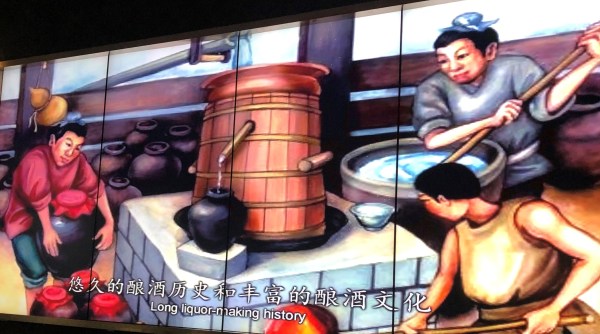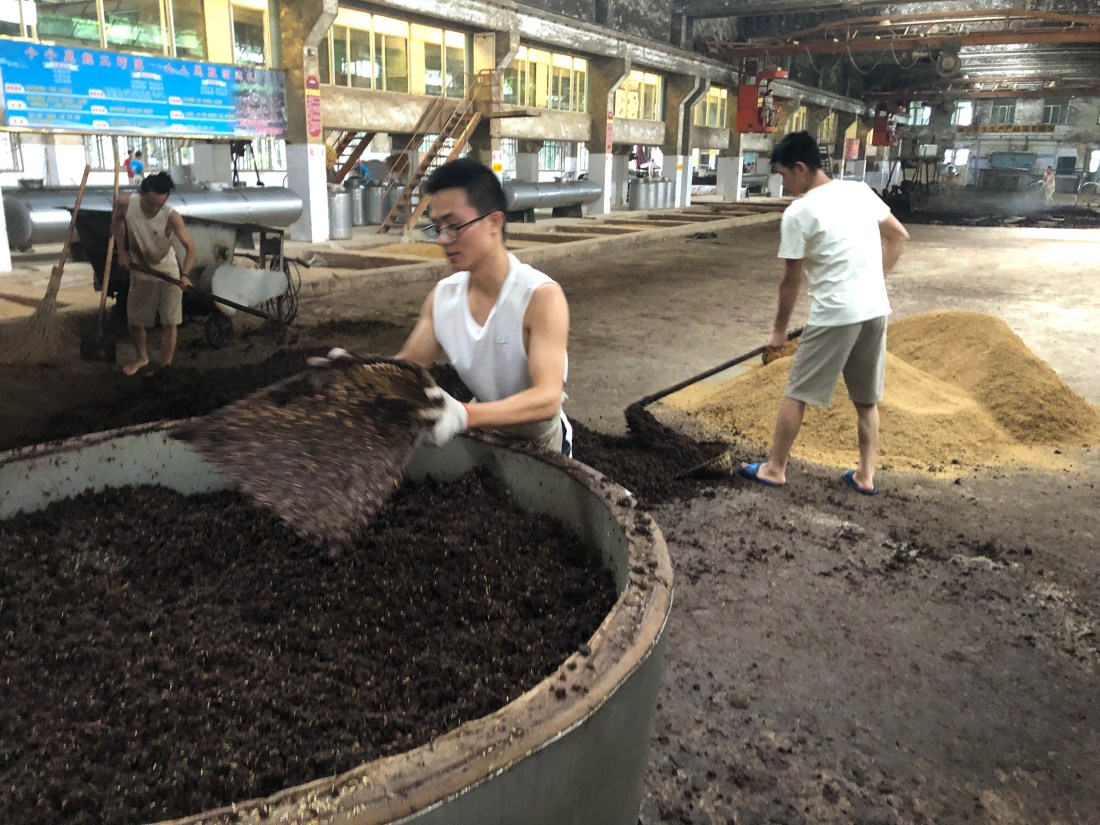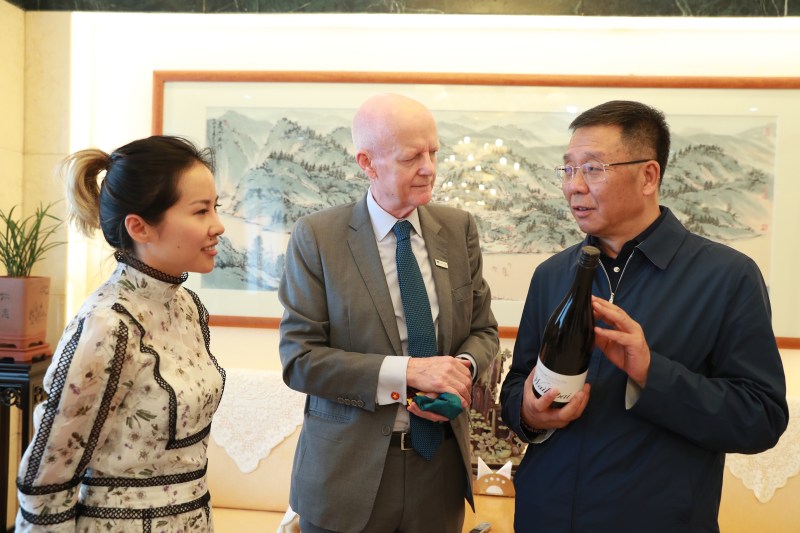Latest posts by Martin Moodie (see all)
- Discovering a fresh philosophy in Shenzhen and talking Trinity in Ho Chi Minh City - April 24, 2024
- How I overcame Severe Tire Damage to become the oldest influencer in town - April 20, 2024
- Free as a (Kiwi) bird and flying high in Haikou - April 13, 2024
 As I step onto my balcony at the splendid Maotai International Hotel, I know I am in baiju country. But not just any baiju. We’re talking Kweichow Moutai, the most famous baiju, in fact the most famous liquor in all the vast nation of China.
As I step onto my balcony at the splendid Maotai International Hotel, I know I am in baiju country. But not just any baiju. We’re talking Kweichow Moutai, the most famous baiju, in fact the most famous liquor in all the vast nation of China.
 After a near 27-hour trip from London to the pretty town of Maotai (a distinct spelling) in the northern stretches of Guizhou province, the view is as intoxicating as the Moutai aroma that fills the air. “The bouquet pervades across China and Moutai is still the best,” runs an old adage.
After a near 27-hour trip from London to the pretty town of Maotai (a distinct spelling) in the northern stretches of Guizhou province, the view is as intoxicating as the Moutai aroma that fills the air. “The bouquet pervades across China and Moutai is still the best,” runs an old adage.
Down below me, the beautiful Chishui River (‘the beautiful liquor river’) flows serenely through the town as it has for centuries, its pure waters integral to the classic Chinese baiju spirit made nearby. Maotai dubs itself ‘China’s first liquor town”, a well-deserved sobriquet given the liquor industry’s 1,000-year history here. Beyond the river, the lush, forest-clad mountains, covered the next morning in a mist that looks and smells like steam from the distillery, stretch far into the distance.

What a place then to set up an all-too temporary Moodie Davitt Report Interim Bureau. Maotai International Hotel is a grand complex set in a Chinese garden. Stone paths line the way; corridors, pavilions and traditional buildings juxtapose perfectly to evoke the sense of tradition that underpins this town at every step.

I’m here in Maotai to discover – and in time tell – the story of Kweichow Moutai, the world’s most valuable spirits house and brand. Yes, bigger (in market capitalisation) than Diageo’s glittering Johnnie Walker-to-Smirnoff stable or Pernod Ricard’s star-studded Chivas-to-Martell portfolio. Kweichow Moutai, part of a state enterprise but publicly listed, is a giant among brands, a fine spirit for which demand constantly exceeds supply and which enjoys a popularity throughout China bordering on the reverential.


I’ve come here with members of the Camus team, the independent Cognac house now in its fifth generation of family control under the admirable Cyril Camus. Next year, Camus celebrates its 15th year of representing Kweichow Moutai in duty free worldwide – a channel that ranks as the brand’s biggest export market.
As Chinese outbound travel has boomed in the 21st century, so has the profile of baiju, but particularly Kweichow Moutai, within the duty free market. Today, any self-respecting international duty free retailer with a significant Chinese passenger base will stock Kweichow Moutai. They might not be able to secure as much as they like (due to strict product allocations) but whatever stock they have will quickly sell at an impressive average US$320-$420 pricepoint (depending on sku) for a 375ml bottle. At Changi Airport and on ishopchangi.com, DFS sells the limited-edition Kweichow Moutai The Year Of Dog 2018 375ml for S$740 (US$530).

That travel retail success is down to the quality of the spirit, its treasured status within China, and the pioneering efforts of Cyril Camus and his team. The early years of pioneering Moutai internationally were not easy, as retailer upon retailer complained that they would be unable to sell it. Today their only complaint is that they can’t get enough supply. To celebrate those 15 years of collaboration, we are producing a special eZine later this year that highlights the brand, its fascinating production process, rich history, and clearly golden future.
To lay the ground for that study, I spent yesterday touring the Kweichow Moutai facilities from distillery to warehouse to musuem (the superb Chinese Liquor Culture City) to headquarters. I saw sights and discovered facts that left me wide-eyed in wonder. History oozes out of every corner here, like the famous Moutai that breathes through the ceramic urns in which it is aged.














At the corporate headquarters I had the honour – and I assure you it is the rare honour – of interviewing Li Baofang, Chairman and Party General Secretary of the China Kweichow Moutai Distillery (Group) Co and Chairman of Kweichow Moutai Co.
It was not an occasion for the faint-hearted journalist. When I arrived in the interview room I was met by an audience of around 14 company officials, media and translators. Chairman Li and I were positioned at the top of the room in adjacent chairs together with microphones so our words could be easily heard by the audience, recorded and translated in both directions. Within hours of the interview, a report was live on the official Kweichow Moutai WeChat platform.





We exchanged gifts (mine a superb Waihopai Valley single vineyard Pinot Noir from Marlborough in my native New Zealand produced by my good friends the Giesen Brothers; Mr Li’s a selection of magnificent books outlining the history and processes of Moutai, plus an extra special presentation – more of that in a moment) and greetings then got down to business.

The bi-lingual translation over an enthralling two-hour interview was provided with impeccable, unwavering understanding, concentration and subtlety by Camus Director – Chinese Spirits Jingyi (Judal) Zhao (pictured below), a human dynamo who was been my fine companion and outstanding guide over the past two days.

When I first entered Moutai headquarters, I was asked to pose for an official picture. As my interview with Mr Li concluded, I realised why. He presented me with a splendid 15 year-old Moutai with my photograph embedded as a back label. An elegant touch from a company that believes passionately in the power of its wonderful spirit to create long-lasting relationships.




After an enjoyable dinner at the Maotai International Hotel last night, at which we of course downed several glasses of Kweichow Moutai – the perfect accompaniment with great Chinese cuisine – we drove through the night to the city of Guiyang, from whence I flew out this morning to Shanghai and on to Singapore. As I write this Blog onboard Juneyao Airlines 1605 en route to Changi, my tastebuds still remind me of Moutai and my memories are overflowing with it.


